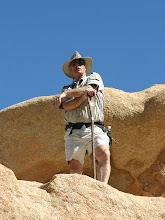OK so here is a list of excuses as to why I haven't been updating the O'blogitory (insert your list here). That out of the way let's talk about this paradox.
Water is the chief cause of death by stupidity in the desert. You either have too much or not enough. On the other hand here is no such thing as enough water in the desert.
Too much water means you don't cross fast deep water when it's raining. Not enough water means you always have at least a half case in your car. Nuff said.
I really came here to talk about GPS. The miracle device of the 21st century. Every new car seems to have one. Most people who go hiking have one. My preference is the Earthmate PN-20; It's an all purpose GPS which means marine charts, aircraft sectionals, specialty maps and digital imagery can be downloaded into it along with the standard street and topo maps. Some hand-held GPS units can even be tracked like the Garmin Rino series. Automotive GPS is usually built around a street navigation system. As a rule the GPSs in your car does not have a topo map although it is available as an extra in some (usually just downloaded from a DVD). Handheld GPS units can also be hooked to a laptop for route planning, realtime tracking and a few other things.
That brings us to the next issue of Sun Runner Magazine which is the annual Desert Travel issue. For that I've written an article about driving in the desert. After it was sent in and therefore to late to change it I ran across several articles about GPS in your car and realized something. They don't always work. Don't get me wrong I love my GPS with all of it['s features it's a great gadget however it has it's shortcomings. The first being it is not a replacement for a map and compass and knowing how to read and use them. The second is batteries die. In a car it's easy enough to carry extras for a portable GPS but on a long hike you could go through a set of batteries easily in a day. Lastly a GPS can lead you astray and really get you into deep doo doo.
This came home to me recently months after I had the experience. A group of us in two cars with two-way radios got separated on a trip together. I followed the route I mapped in a laptop and downloaded to an Earthmate GPS while my son-in-law followed the route presented to him by the GPS built into his car. About halfway into the trip his GPS took him off the main highway and into the mountains adding time and distance to his trip. Checking the map showed a place where the mountain road eventually came back to the main highway so we arranged a meeting place with the two-way radios. He was lucky. It was not so for people all over the U.S. and Canada as they blindly followed their GPSs. In one incident it cause a couple and their baby to spend several days trapped in the snow in Oregon and in August 2009 it lead a woman into Death Valley, Calif where it cost the life of her son. The only reason she survived was because a ranger saw her car tracks and followed them. The point is don't just blindly accept what the GPS presents you. When planning a route in the laptop I can always find a better, faster and cheaper way or a way that will take me by something I want t see than what is presented to me. Use paper or Google Maps to plan your route, print it out then enter that into your GPS. Sure it takes some time but that's better than being lead astray and it gives you a paper reference to look at in a scale that's easier on the eyes. We have come to blindly accept technology and we expect it to work. The problem is technology doesn't always do that.
03 February 2010
Subscribe to:
Post Comments (Atom)




No comments:
Post a Comment